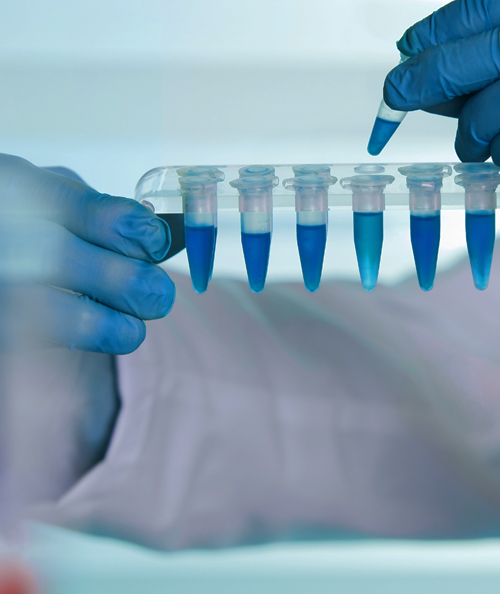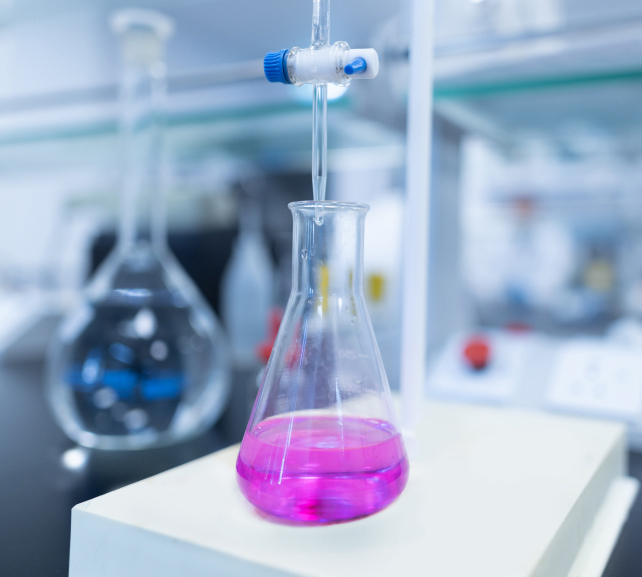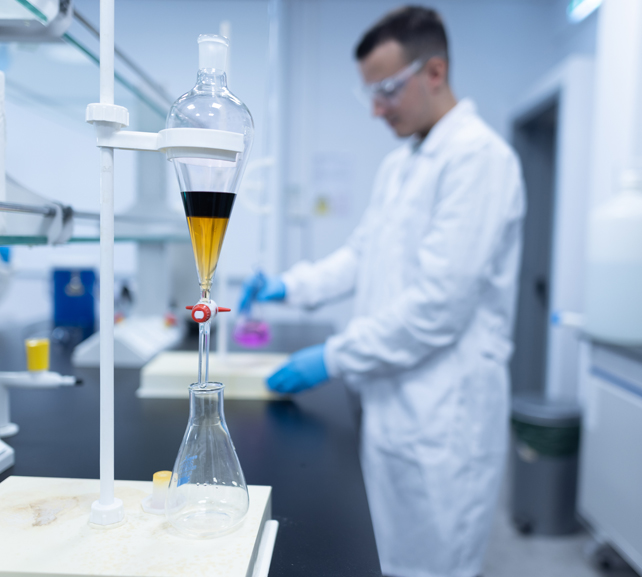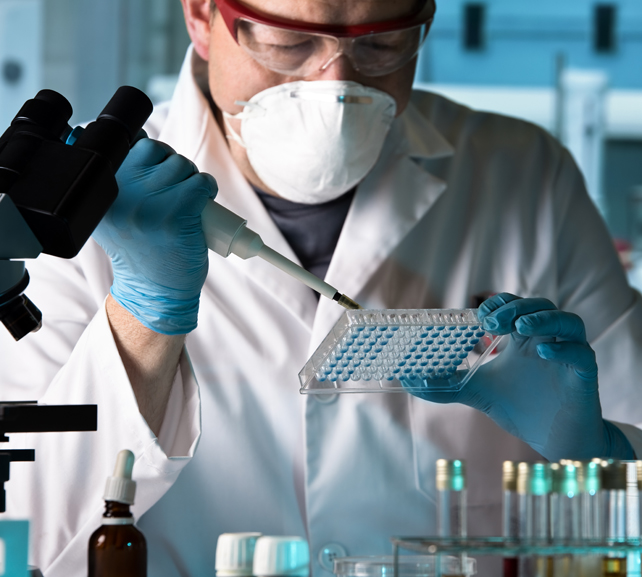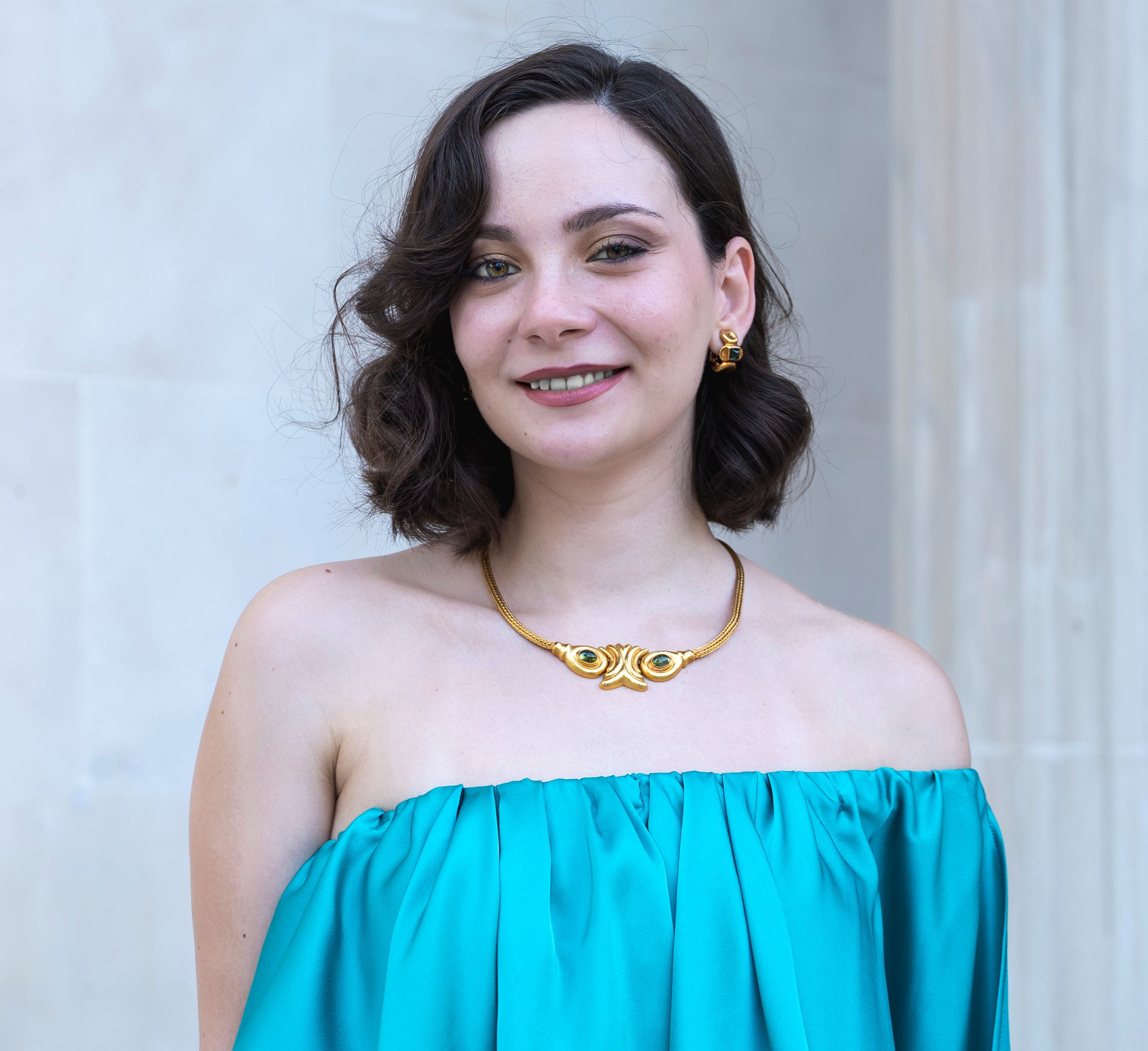PROGRAM DETAILS
Duration4 years (full time)
Fees
€10,080 per year
LanguageGreek
CampusNicosia
The broader and ultimate goal of the program, is to educate students in the multidimensional field of Biomedical Sciences and, in collaboration with Clinical Laboratories, to provide them with appropriate opportunities for hands on, practical learning. This combination will make them more competitive in the labor market and provide them with the foundations for continuous learning and development in the important sector of Health Sciences. The program is supported by the Association of Clinical Laboratory Directors, Biomedical and Clinical Laboratory Scientists and the Karaiskakio Foundation. A strong and innovative feature is the active participation in the program of future employers, both in teaching and in the practical training of students.
This Program aims to provide graduates with a fully specialised training in the multidisciplinary science of Clinical Biomedicine, and provide them with the necessary knowledge and skills required for employment in multiple sectors of the labor market such as: Clinical Biomedical Laboratories, hospitals, clinics, research laboratories, Universities, Research Institutes. It is the only Applied Biomedical Sciences program in Cyprus.
The language of instruction is Greek.
* In addition to the theoretical courses, the BSc in Applied Biomedical Sciences also includes a number of laboratory courses, as well as a six-month internship to acquire clinical skills that are important for employers. The practical experience takes place in reputable research organisations like the Karaiskakio Foundation and in some of the biggest Clinical Laboratories in Cyprus, such as the SYNLAB Cyprus, the Charis Charilaou Biomedical Laboratories and the ACT BIO Clinical and Molecular Laboratory.
The curriculum is designed in such a way as to encourage students to first acquire the theoretical knowledge and basic principles on which the fields of Biomedical Science are based. The students will then be trained in professional skills and acquire the expertise required, for immediate integration and employment in Clinical Laboratories. The strong and innovative feature of the program is the active participation of employers both in teaching and professional training of students.
Upon completion of the program, graduates are expected to:
1. Acquire the scientific knowledge, training and skills required in all areas of the biomedical sciences. Apply laboratory techniques for the analysis of biological samples for the purpose of a thorough diagnosis of diseases.
2. Develop the attitudes and skills necessary to work across the spectrum of biomedical research fields.
3. Acquire the broad bases, techniques and methods used in biomedical research, research management, legal and ethical aspects of research, and respond to emerging challenges in public health.
4. Develop professional behavior, and apply the principle of social justice in professional practice with respect for clients/patients and their culture.
5. Practice the profession with respect for other health professionals and citizens, acquiring relevant skills in both teamwork and individual work.
6. Recognize the limitations and the need to maintain and update professional skills, with particular emphasis on continuous autonomous acquisition of new knowledge related to new biomedical research ideas, products and techniques and to be active in maintaining professional excellence.
7. Acquire effective communication, oral and written, and know how to use information technologies, especially those related to biomedical and health sciences. Explain the subject matter and demonstrate the multifaceted aspects of Biomedical science and its applications for individual and public interest.
8. Acquire basic training in research, developing a hypothesis and knowing how to collect and interpret information to solve problems using scientific methods. To interpret the results and observations of both diagnostic and research programs in the biomedical sciences.
The prospects for employing the graduates are very high. The number of Clinical Laboratories now count more than 100 in Cyprus, and therefore there is an increased demand for academically and professionally trained, good quality candidates, who graduate with already acquired work skills that is a pre-requisite by employers.
The graduates, because of the combined knowledge and training that they will receive, will have the knowledge and skills to be directly employed in accredited Clinical laboratories, in either the public or private sectors. They will have a balanced and extensive theoretical as well as a practical knowledge, that will strengthen their employment prospects in any Clinical laboratory setting. In addition, graduates will have all the essential skills required to work independently, or as members of teams, being fully aware of good laboratory practice as well as ethical and privacy issues.
It is important to note that the graduates of the Applied Biomedical Sciences program will have the Qualifications to be employed in several occupations, in both the public and private sectors, such as:
• Clinical/Medical laboratories
• Hospital laboratories
• Research Institutes or University research laboratories
• In industry such as pharmaceutical companies / analytical laboratories
• Continue their studies for postgraduate degrees, in Health Sciences or related fields such as Molecular Biology/Genetics/Biotechnology
• Work in Patients Advocacy Associations, analysing and publishing health data.
Specific Admission Requirements
• To enrol in the BSc program in Applied Biomedical Sciences, a High School/Secondary School Leaving Certificate with an overall grade of 15/20 is required.
• Very good knowledge of the Greek and English languages (acceptable certificates can be TOEFL, IELTS, GCSE, IGCSE and Cambridge Certificate of Proficiency in English or other equivalent).
Special Admission Criteria
The selection of the candidates will be determined after an oral interview, which will be conducted by a three-member evaluation committee, consisting of the coordinator of the Program and two (2) faculty members of the Department. The committee will have the right to indicate the selection of certain elective courses.
The Specific Admission Requirements / Criteria for the BSc in Applied Biomedical Sciences Program are as follows:
1. Grade of at least 15/20 in Biology and Chemistry courses.
2. Students who do not meet the above criteria will be able to attend preparatory courses and pass exams for the admission to the program.
3. Personal interview.
Recognition of Prior Learning
There are no specific arrangements for recognition of prior learning for this Program. Candidates can be granted transfer credits according to the general arrangements for recognition of prior learning of the University.
There are no specific examination regulations, assessment and grading methods employed by this Program. The examination regulations, assessment methods and grading system for this Program are the same as the relevant general university regulations.
Graduation Requirements
Students are eligible for graduation after successfully completing 240 ECTS credits in the courses listed in the Program Structure.
Furthermore, a student can graduate only if their CGPA is greater or equal to 5.00 out of 10.00. Graduating students with a CGPA less than 5.00 might have to take extra courses or repeat a number of courses in order to improve their grades.
Access to Further Studies
The graduates of the Program have access to graduate studies (2nd and 3rd Cycle) in disciplines related with the discipline of Biomedical Sciences.
Module Group
ECTS
The student must successfully complete 218 ECTS, from the following list of modules:
| No. | Code | Name | ECTS | Hours / week |
|---|---|---|---|---|
| 1 | ABS101 | CHEMISTRY FOR BIOMEDICAL SCIENCES | 6 | 3+2 |
| 2 | ABS102 | MATHEMATICS AND ELEMENTS OF STATISTICS | 6 | 3+1 |
| 3 | ABS103 | BIOCHEMISTRY I | 6 | 3+2 |
| 4 | ABS104 | INFORMATION SYSTEMS IN HEALTH | 4 | 2+1 |
| 5 | ABS105 | CELL BIOLOGY AND GENETICS | 6 | 3+2 |
| 6 | ABS106 | BIOCHEMISTRY II | 6 | 3+2 |
| 7 | ABS107 | HUMAN ANATOMY | 5 | 2+1 |
| 8 | ABS108 | HUMAN PHYSIOLOGY | 6 | 3+1 |
| 9 | ABS110 | DIETETICS AND NUTRITION | 3 | 2 |
| 10 | ABS112 | ETHICS FOR BIOMEDICAL SCIENCES | 3 | 2 |
| 11 | ABS201 | INTRODUCTION TO MICROBIOLOGY | 6 | 3+2 |
| 12 | ABS202 | INTERNAL MEDICINE AND PATHOPHYSIOLOGY I | 6 | 3 |
| 13 | ABS203 | HEALTH AND SAFETY AT WORK | 6 | 3+2 |
| 14 | ABS204 | BIOSTATISTICS | 3 | 2+1 |
| 15 | ABS205 | EPIDEMIOLOGY AND PUBLIC HEALTH | 6 | 3+2 |
| 16 | ABS206 | QUALITY ASSURANCE AND ACCREDITATION IN BIOMEDICAL SCIENCES | 4 | 2+1 |
| 17 | ABS207 | INTRODUCTION TO HAEMATOLOGY | 6 | 3+2 |
| 18 | ABS208 | EPIDEMIOLOGY OF INFECTIOUS DISEASES | 6 | 3+2 |
| 19 | ABS209 | INTRODUCTION TO IMMUNOLOGY | 6 | 3+2 |
| 20 | ABS210 | MOLECULAR BIOLOGY AND BIOTECHNOLOGY | 6 | 3+2 |
| 21 | ABS301 | CLINICAL CHEMISTRY | 6 | 3+2 |
| 22 | ABS302 | INTEGRATED PHYSIOLOGY | 6 | 3+2 |
| 23 | ABS303 | BIOMEDICAL INSTRUMENTATION | 6 | 3+2 |
| 24 | ABS304 | IMMUNO-HEAMATOLOGY | 6 | 3+2 |
| 25 | ABS305 | MEDICAL MICROBIOLOGY | 6 | 3+2 |
| 26 | ABS306 | LABORATORY TECHNIQUES IN BIOMEDICAL SCIENCES | 6 | 2+10 |
| 27 | ABS307 | MOLECULAR VIROLOGY | 6 | 3+2 |
| 28 | ABS308 | PHARMACOLOGY | 6 | 3+2 |
| 29 | ABS310 | ADVANCED IMMUNOLOGY | 6 | 3+2 |
| 30 | ABS401 | INTERNAL MEDICINE AND PATHOPHYSIOLOGY II | 4 | 3 |
| 31 | ABS402 | TOXICOLOGY | 6 | 3+2 |
| 32 | ABS403 | PHARMACEUTICAL BIOTECHNOLOGY | 4 | 3+1 |
| 33 | ABS404 | PRECISION MEDICINE /BIOMARKERS | 6 | 3+2 |
| 34 | ABS405 | ADVANCED HEMATOLOGY AND TRANSPLANTATION | 5 | 3+2 |
| 35 | ABS406 | PARASITOLOGY AND MYCOLOGY | 6 | 3+2 |
| 36 | ABS407 | RESEARCH METHODOLOGY | 5 | 3+2 |
| 37 | ABS408 | UNDERGRADUATE THESIS | 12 | 3 |
| 38 | ABS409 | INTRODUCTION TO BIONFORMATICS | 6 | 3+2 |
| 39 | AENG141 | BASIC ENGLISH FOR PHARMACEUTICAL SCIENCES | 2 | 4 |
| 40 | AENG142 | INTERMEDIATE ENGLISH FOR PHARMACEUTICAL SCIENCES | 2 | 4 |
The student must successfully complete 12 ECTS, from the following list of modules:
| No. | Code | Name | ECTS | Hours / week |
|---|---|---|---|---|
| 1 | ABS309 | PRINCIPLES OF BIOMEDICAL SCIENCES; THE DISCIPLINES | 6 | 3 |
| 2 | ABS311 | BIOCHEMISTRY OF EXERCISE AND SPORTS | 6 | 3 |
| 3 | ABS313 | HUMAN GENETICS IN THE 21ST CENTURY | 6 | 3 |
| 4 | ABS410 | METABOLISM AND DISEASES | 6 | 3 |
| 5 | ABS411 | MOLECULAR PATHOLOGY OF COMPLEX DISEASES | 6 | 3 |
| 6 | ABS413 | MOLECULAR PHARMACOLOGY | 6 | 3 |
| 7 | ABS414 | ENTREPRENEURSHIP THEORY IN BIOMEDICAL SCIENCE | 6 | 3 |
| 8 | ABS415 | INNOVATION STUDIES | 6 | 3 |
Total
120
Semesters
ECTS
| No. | Code | Name | ECTS |
|---|---|---|---|
| 1 | ABS101 | CHEMISTRY FOR BIOMEDICAL SCIENCES | 6 |
| 2 | ABS103 | BIOCHEMISTRY I | 6 |
| 3 | ABS105 | CELL BIOLOGY AND GENETICS | 6 |
| 4 | ABS107 | HUMAN ANATOMY | 5 |
| 5 | AENG141 | BASIC ENGLISH FOR PHARMACEUTICAL SCIENCES | 2 |
| 6 | FREE ELECTIVE | 5 | |
| TOTAL | 30 |
| No. | Code | Name | ECTS |
|---|---|---|---|
| 1 | ABS102 | MATHEMATICS AND ELEMENTS OF STATISTICS | 6 |
| 2 | ABS104 | INFORMATION SYSTEMS IN HEALTH | 4 |
| 3 | ABS106 | BIOCHEMISTRY II | 6 |
| 4 | ABS108 | HUMAN PHYSIOLOGY | 6 |
| 5 | ABS110 | DIETETICS AND NUTRITION | 3 |
| 6 | ABS112 | ETHICS FOR BIOMEDICAL SCIENCES | 3 |
| 7 | AENG142 | INTERMEDIATE ENGLISH FOR PHARMACEUTICAL SCIENCES | 2 |
| TOTAL | 30 |
| No. | Code | Name | ECTS |
|---|---|---|---|
| 1 | ABS201 | INTRODUCTION TO MICROBIOLOGY | 6 |
| 2 | ABS203 | HEALTH AND SAFETY AT WORK | 6 |
| 3 | ABS205 | EPIDEMIOLOGY AND PUBLIC HEALTH | 6 |
| 4 | ABS207 | INTRODUCTION TO HAEMATOLOGY | 6 |
| 5 | ABS209 | INTRODUCTION TO IMMUNOLOGY | 6 |
| TOTAL | 30 |
| No. | Code | Name | ECTS |
|---|---|---|---|
| 1 | ABS202 | INTERNAL MEDICINE AND PATHOPHYSIOLOGY I | 6 |
| 2 | ABS204 | BIOSTATISTICS | 3 |
| 3 | ABS206 | QUALITY ASSURANCE AND ACCREDITATION IN BIOMEDICAL SCIENCES | 4 |
| 4 | ABS208 | EPIDEMIOLOGY OF INFECTIOUS DISEASES | 6 |
| 5 | ABS210 | MOLECULAR BIOLOGY AND BIOTECHNOLOGY | 6 |
| 6 | FREE ELECTIVE | 5 | |
| TOTAL | 30 |
| No. | Code | Name | ECTS |
|---|---|---|---|
| 1 | ABS301 | CLINICAL CHEMISTRY | 6 |
| 2 | ABS303 | BIOMEDICAL INSTRUMENTATION | 6 |
| 3 | ABS305 | MEDICAL MICROBIOLOGY | 6 |
| 4 | ABS307 | MOLECULAR VIROLOGY | 6 |
| 5 | BIOMEDICAL ELECTIVE | 6 | |
| TOTAL | 30 |
| No. | Code | Name | ECTS |
|---|---|---|---|
| 1 | ABS302 | INTEGRATED PHYSIOLOGY | 6 |
| 2 | ABS304 | IMMUNO-HEAMATOLOGY | 6 |
| 3 | ABS306 | LABORATORY TECHNIQUES IN BIOMEDICAL SCIENCES | 6 |
| 4 | ABS308 | PHARMACOLOGY | 6 |
| 5 | ABS310 | ADVANCED IMMUNOLOGY | 6 |
| TOTAL | 30 |
| No. | Code | Name | ECTS |
|---|---|---|---|
| 1 | ABS401 | INTERNAL MEDICINE AND PATHOPHYSIOLOGY II | 4 |
| 2 | ABS403 | PHARMACEUTICAL BIOTECHNOLOGY | 4 |
| 3 | ABS405 | ADVANCED HEMATOLOGY AND TRANSPLANTATION | 5 |
| 4 | ABS407 | RESEARCH METHODOLOGY | 5 |
| 5 | ABS409 | INTRODUCTION TO BIONFORMATICS | 6 |
| 6 | BIOMEDICAL ELECTIVE | 6 | |
| TOTAL | 30 |
| No. | Code | Name | ECTS |
|---|---|---|---|
| 1 | ABS402 | TOXICOLOGY | 6 |
| 2 | ABS404 | PRECISION MEDICINE /BIOMARKERS | 6 |
| 3 | ABS406 | PARASITOLOGY AND MYCOLOGY | 6 |
| 4 | ABS408 | UNDERGRADUATE THESIS | 12 |
| TOTAL | 30 |
The delivery of the program of study is supported by the following members of staff:
| Rank | Name |
|---|---|
| Professor - Programme Coordinator | Dr. Kyriacos Kyriacou |
| Associate Professor | Dr. Maria Kalourkoti Rikkou |
| Associate Professor | Dr. Konstantinos Tatas |
| Associate Professor | Dr. Charalampos Triantis |
| Assistant Professor | Dr. Despina Charalambous |
| Assistant Professor | Dr. George Miltiadou |
| Assistant Professor | Dr. Elena Papacosta |
| Assistant Professor | Dr. Maria Papasavva |
| Assistant Professor | Dr. Alexandra Skitsou |
| Assistant Professor | Dr. Panagiotis Theodosis Nompelos |
| Assistant Professor | Dr. Panagiotis Theodosis Nompelos |
| Visiting Lecturer | Dr. Savvas Ioannou |
| Visiting Lecturer | Dr. Sophia Kyradji |
| Special Teaching Staff | Ms. Irene Angastinioti |
| Special Teaching Staff | Ms. Vasso Peristiani |
| Special Teaching Staff | Mr. Michalis Skoullou |
| Collaborating Acad. Staff | Dr. Panayiotis Paoullis |



